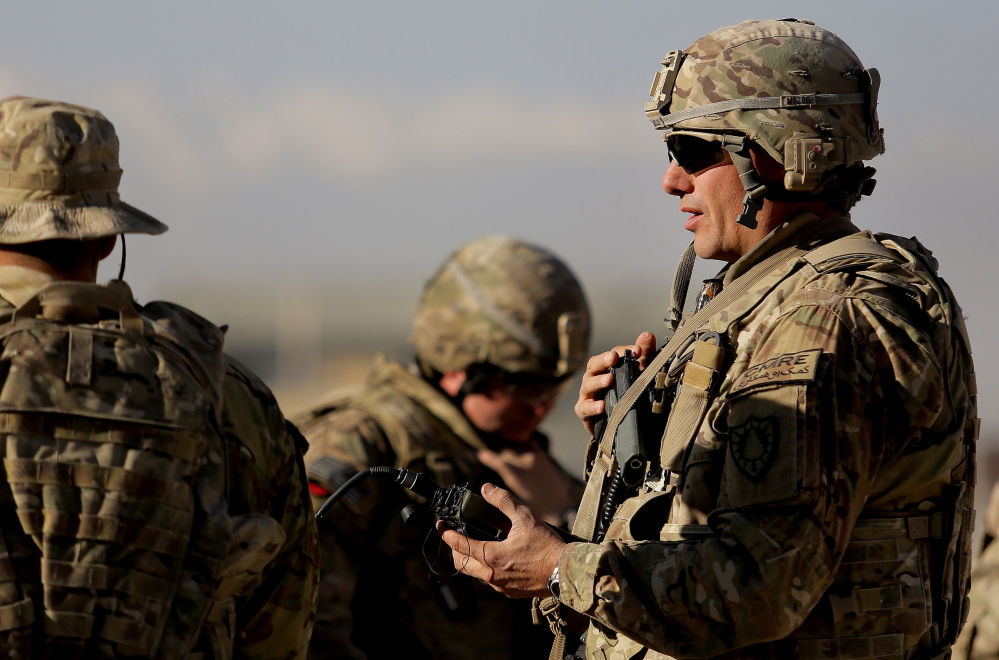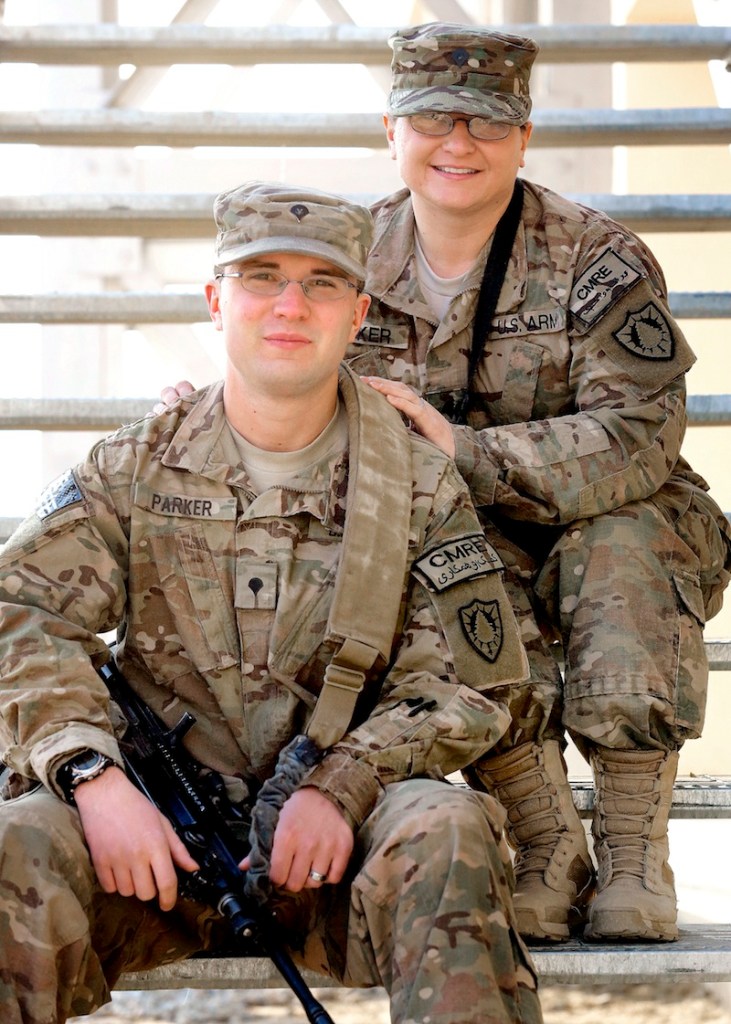BAGRAM AIR FIELD, Afghanistan — Call it a sign of the times: A decade ago, when the Maine Army National Guard’s 133rd Engineer Battalion first went off to war in Iraq, the average age of its soldiers was 36.
“Now it’s 26,” said Lt. Col. Dean Preston, the battalion’s commander and a 24-year veteran of the Maine Guard.
Yet with all the 20-somethings who now bear Maine’s pine-tree patch on the left shoulder of their desert camouflage uniforms, averages can be deceptive.
Sprinkled here and there in this battalion of almost 200 “citizen soldiers” are those who gave up more than their share as citizens to take on the difficult and sometimes dangerous duties of a soldier.
They’re either past 40 or fast approaching it. Their job titles at home have achievement written all over them, while their military ranks here put them among comrades young enough to be their children.
Just ask Spc. Holly Parker, 41, of Brooks, a senior credit analyst with Bank of America in Belfast whose current day job is human resources specialist in the 133rd’s personnel section. Toiling two tents down from her in the supply section is her 24-year-old son, Spc. Andrew Parker of Belfast.
“I’m glad I could come with him,” said Parker, who was 39 when she enlisted in 2011. “I’d just rather he didn’t have to come with me.”
Parker always wanted to be a soldier. Her father, Robert Hamilton of Brooks, was a Vietnam veteran and an Army recruiter. Her husband, Sgt. 1st Class Randal Parker, served with the 133rd in Iraq and still works full time for the Maine Guard.
“I grew up saluting, and when my husband and I were dating in high school, he used to say that my dad had taken my brain out and washed it in a bucket of Army,” Parker recalled with a laugh. “But if you do the math, you’ll see that I had Andrew a little young. So I was kind of busy raising him.”
DETERMINED TO MAKE THE GRADE
Parker went to work for MBNA in 2001 and, when that credit card giant was bought out by Bank of America in 2006, kept working her way up the ladder to her current job, analyzing credit-card applications at the company’s office in Belfast. But as her 40th birthday loomed, Parker felt something was missing.
“I was 39 and I’m sitting in my cubicle at work and I’m thinking, ‘You know, I could probably do even more than this,’ ” she said.
So in March of 2011, just six weeks before the National Guard dropped its maximum enlistment age from 42 to 35, Parker took the plunge.
Before she could get to basic training, she had to sweat her way through the Guard’s “Recruitment Sustainment Program.” Her first assignment: lose 60 pounds.
She did it, at a steady rate of five pounds per month, by running up and down the hilly roads of Waldo County, working out to an array of exercise videos at home and “eating the same thing (Shakeology meal replacement shakes) every day for a year.”
One drill weekend, while running relay sprints against 18-year-olds, Parker partially tore a calf muscle.
It healed.
Then, while doing repetitive push-ups, she tore a rotator cuff in her shoulder. It took surgery to fix that.
Finally, one day, her first sergeant called Parker into his office and tactfully asked, “Private Parker, you’re still set on doing this, right?”
“Yes, first sergeant,” she replied pleadingly. “Don’t give up on me. I can do this. I know I can do this!”
And she did. Late last year, Parker passed basic training at Fort Sill, Okla., just in time to find out that the 133rd, to which she’d been attached, was slated for a nine-month deployment to Afghanistan.
Surprise number two: Her son, who had enlisted seven months after she did, was going with her.
(Is Spc. Andrew Parker OK about serving with Mom in a war zone? “Without a doubt,” he replied. “If we could have had Dad here too, it would have been even more awesome.”)
SEASONED VOICES OF SUPPORT
Beyond her son’s presence – for poor Andrew, Parker quipped, “what happens in deployment doesn’t stay in deployment” – the 40-plus specialist sees value in a few soldiers her age helping to calm the emotional currents of an increasingly youthful battalion.
“That whole rebellion thing, that’s long gone,” Parker said. “When you’re 40, you’ve had experience with rolling with the punches and doing what you’re told. We all have a boss, right?”
And, in her case, a benevolent one: Even as Parker collects her National Guard pay, Bank of America is paying her full salary for the first 90 days she’s away from her civilian job. After that, the bank will make up any difference between what she made back in Belfast and what’s she’s paid in theater as an Army specialist.
“It’s a great job and they’re very supportive of me over here,” said Parker. “It’s just a great company to work for.”
Ditto for Sgt. Todd Mills, 46, of Gorham. With no loss of income, he’s stepping away for nine months from his suit-and-tie job as a senior portfolio manager for TD Bank in Portland because … why?
“I felt like a hypocrite,” replied Mills, who served for 10 years as a much younger man in the Army Reserve but never deployed. Then, one day in 2006, he found himself watching his 26-year-old son, Michael, fly off to Afghanistan as a military policemen with the Army.
“I told my wife (Francine), ‘It’s now or never,’ ” Mills recalled. “I just felt like I wasn’t doing my part. When I look back in 20 years and say, ‘All right, this is what you did,’ I know I’ll feel good about it.”
Mills frequently sees himself as a mentor for younger soldiers caught between the obvious challenges of life in a war zone and the less detectable but equally difficult stresses of separation from girlfriends, wives and, toughest of all, young children. (In addition to Michael, Mills has a 22-year-old daughter, Nicole, and a 17-year-old son, Zach.)
“Your heart breaks and aches for them,” Mills said, recalling the anguish of more than a few young soldiers who logged onto Skype on Christmas Eve only to find that their families were still offline because of this week’s ice storm.
It was, he said, “one of those days where I think I sort of earned the right to be here by being there for those guys who needed it.”
AN UNFORGETTABLE WAR STORY
Mills is a member of the 133rd’s convoy escort team, meaning he’s spent more than 40 days so far serving as a truck commander on more than a dozen missions all over northern, eastern and southern Afghanistan. Amid the inherent danger in all of that (his unit came under small-arms fire on one trip, but no soldiers were wounded), one outside-the-wire encounter stands high above all the rest.
It was early one morning, just before dawn. A truck under escort by the 133rd’s team had rolled onto its side, forcing the entire convoy to a full stop in a small Afghan village while a wrecker went about righting the disabled vehicle.
“Then the sun came up and we heard the call to prayer and pretty soon all the villagers came out – and we’re just sitting there,” Mills said. “The adults all stood back and watched, but not the kids.”
In Afghanistan’s male-dominated society, such situations invariably play out the same way: The young boys come closest to the massive military trucks and fight tooth-and-nail for whatever candy and other treats the U.S. soldiers might toss their way. The girls, who wouldn’t stand a chance in the fracas, typically hang back and watch.
“There was this beautiful little girl,” recalled Mills. “She’s sitting there, all dirty and cold and barefoot.”
Mills, in cahoots with his convoy commander, Lt. Joseph White of Brewer, quickly mapped out a plan: Toss a few pieces of candy way off to one side to draw away all the boys. Then, with the boys fully distracted, sneak an unopened Pop-Tart to the little girl.
“She picked it up and she looked at us with big wide eyes and she ran over to this group of other girls,” Mills said. “Then she opened it up and broke it up into little pieces and all the little girls shared it. So by the time the boys came over, all of these little girls had a small piece and were eating them.”
It was, of course, the tiniest of ripples in the deep and often dark pool that is Operation Enduring Freedom.
At the same time, though, Mills felt light years away from the suit, the tie and all the other trappings of a typical, middle-age American bank executive’s daily routine.
A high-performing investment portfolio, after all, is nice. But the smiles of so many Afghan girls sharing their first-ever Pop Tart? That’s off the charts.
“Those are the things where you sit back and go, ‘God that was amazing,’ ” Mills said, still savoring his favorite war story. “Those are the things you want to remember.”
Bill Nemitz can be contacted at:
bnemitz@pressherald.com
Send questions/comments to the editors.






Success. Please wait for the page to reload. If the page does not reload within 5 seconds, please refresh the page.
Enter your email and password to access comments.
Hi, to comment on stories you must . This profile is in addition to your subscription and website login.
Already have a commenting profile? .
Invalid username/password.
Please check your email to confirm and complete your registration.
Only subscribers are eligible to post comments. Please subscribe or login first for digital access. Here’s why.
Use the form below to reset your password. When you've submitted your account email, we will send an email with a reset code.